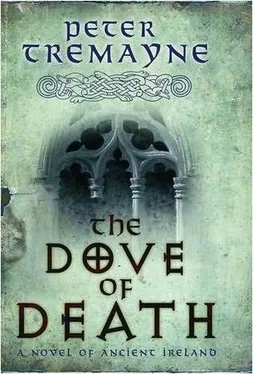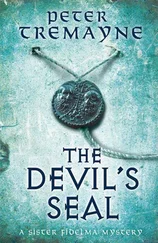Peter Tremayne - The Dove of Death
Здесь есть возможность читать онлайн «Peter Tremayne - The Dove of Death» весь текст электронной книги совершенно бесплатно (целиком полную версию без сокращений). В некоторых случаях можно слушать аудио, скачать через торрент в формате fb2 и присутствует краткое содержание. Жанр: Исторический детектив, на английском языке. Описание произведения, (предисловие) а так же отзывы посетителей доступны на портале библиотеки ЛибКат.
- Название:The Dove of Death
- Автор:
- Жанр:
- Год:неизвестен
- ISBN:нет данных
- Рейтинг книги:5 / 5. Голосов: 1
-
Избранное:Добавить в избранное
- Отзывы:
-
Ваша оценка:
- 100
- 1
- 2
- 3
- 4
- 5
The Dove of Death: краткое содержание, описание и аннотация
Предлагаем к чтению аннотацию, описание, краткое содержание или предисловие (зависит от того, что написал сам автор книги «The Dove of Death»). Если вы не нашли необходимую информацию о книге — напишите в комментариях, мы постараемся отыскать её.
The Dove of Death — читать онлайн бесплатно полную книгу (весь текст) целиком
Ниже представлен текст книги, разбитый по страницам. Система сохранения места последней прочитанной страницы, позволяет с удобством читать онлайн бесплатно книгу «The Dove of Death», без необходимости каждый раз заново искать на чём Вы остановились. Поставьте закладку, и сможете в любой момент перейти на страницу, на которой закончили чтение.
Интервал:
Закладка:
‘The way our great teachers provoked knowledge was taking an opposite view, to induce the student to bring forth argument,’ confirmed Iarnbud.
‘That was also the method in our land,’ agreed Fidelma. ‘But it sometimes gets in the way of the seeker after facts.’
Iarnbud leaned back in his chair and examined her quietly for a moment.
‘Then the facts are simple. This New Faith is spreading through the land. The princes have seized upon it and great centres have been erected, like the abbey built here by Gildas. These new centres dominate the lives of the people. But the beliefs of a thousand years and more are hard to eradicate. The old gods and goddesses live on, and in the depths of the great forests north of here, they are still respected and worshipped. And even among those who follow the Christ, while they might genuflect before His symbols, in their minds they still respect the old gods and the customs of the ancestors.’
Eadulf stirred uneasily. He had been a youth brought up with the gods of the Saxons — Woden, Thunor, Tyr and Freya — until a wandering monk from Hibernia had converted him to the New Faith. But still, in times of stress, it was the old gods that he mentally invoked. Iarnbud’s comment was a telling one.
Iarnbud noticed his discomfort and smiled knowingly.
‘I think you understand me well, Saxon,’ he said, before turning to Fidelma. ‘You have travelled on shipboard to this place, lady. Have you noticed the behaviour of seamen or the fisherfolk? Have they abandoned their faith in the protection of the old sea gods? They have not. They will give them their due, especially to the goddess of the moon who controls the seas. They will not even mention her true name once they set foot on shipboard for fear of her.’
Fidelma had to agree that among the fisherfolk of her own land, this was true, for there were many names by which the moon was called, and all were euphemisms for her proper name. Names such as ‘The Brightness’, ‘The Radiance’, ‘The Queen of the Night’ and ‘The Fair Mare’. She shivered slightly. Was Iarnbud secretly laughing at her?
Eadulf was trying to disguise his irritation.
‘What does it matter?’ he said. ‘Most people accept the Faith now.’
‘The New Faith is but a veneer to disguise other true allegiance to the old ways.’ Iarnbud turned to face him. ‘When your Saxon hordes started to land on the island of Britain, the Britons had long converted to the New Faith and welcomed you at first with talk of peace and the rule of Thou Shalt Not Kill. Your people, crying upon your War God Woden, soon dissuaded them by eliminating them or driving them from the land.’
Eadulf’s jaw tightened. ‘I am not responsible for what my ancestors did,’ he muttered. ‘I live in the present.’
‘And the Saxon kingdoms are now being converted to the New Faith,’ pointed out Fidelma, coming to his defence.
Iarnbud laughed. ‘Indeed, converted by those religious of Hibernia. Do you see any Britons converting the Saxons? The Britons have better sense. One day you Hibernians may regret it.’
Trifina suddenly stretched languorously and yawned.
‘You will excuse me,’ she said, rising to her feet. ‘The hour grows late and I must retire.’
With a glance that embraced the company, she rose and left them.
Eadulf waited until she was ascending the stairs before he turned to Iarnbud.
‘What do you mean,’ he demanded angrily, ‘that the Britons have better sense?’
‘When the Bishop of Rome sent the Roman Augustine to Britain less than a hundred years ago, he decided to meet with the bishops of the Britons. He even chastised them for making no attempt to convert the Angles and Saxons to the New Faith before his coming. Augustine was an arrogant man who had swallowed the stories told him by the Saxons that the Britons were savages. So, when he met the bishops of the Britons, he pitched his camp on their borders and demanded that they come to him. When they did so, he remained seated, not even rising to greet his fellow bishops as was the custom, but launching into a tirade of criticism of their behaviour and rites and rituals. He ordered them to join him in converting the Saxons and accepting his church at the old capital of the British Cantii as their spiritual centre.’
Eadulf frowned. ‘The Cantii?’
‘The town or burgh, as you call it in your language, of the Cantii, Canterbury. Agustine was ignorant as well as arrogant. Did not the Britons have greater and older centres of their faith? There was Blessed Ninian’s great abbey of Candida Casa in Strath-Clóta with its extensive library. And the Blessed Dewi’s abbey of Menevia in Dyfed. Augustine was a brash upstart and the Britons were astounded at his behaviour. And when they refused to submit themselves to him, he lost his temper and in a rage told them that the Saxons would come and the Britons would suffer vengeance for refusing to meet his terms. On his return to his new Saxon flock, he even officially designated Athelberht, the King of Kent, as Bretwalda, ruler over all the Britons.’ Iarnbud’s voice was bitter. ‘So the Britons continued to flee from the Saxon arrogance in search of new lands to dwell in freedom.’
At this point, Bleidbara rose abruptly.
‘Forgive me. I have to be on board my ship early in the morning, for I have duties to attend to.’ The warrior bade a good night to them all and left through the door that led to the kitchen quarters.
No sooner had he departed than the girl, Argantken, rose and said something in pointed tones to Macliau. As the young man stared at her, it was clear to Fidelma from the way his eyes took time to focus that he had indulged himself a little too freely with wine. When Macliau answered her, in a slightly slurred speech, Fidelma was surprised to see the girl flush and reply in petulant fashion, even stamping her foot. Macliau’s face grew angry, his voice irate as he responded. The girl’s mouth became a thin line and she stomped her way across the room and up the stairs.
Macliau glanced at the company with an imbecilic grin, which was obviously meant to be one of apology, but Brother Metellus was pretending not to notice that anything was amiss.
‘We are all human beings,’ the monk was now pointing out, continuing the discussion that had been raging. ‘Augustine was a stranger in a strange land. He was a monk from the Caelian Hill in Rome, and had merely been wrongly advised as to the nature and history of the Britons.’
‘So ignorance excuses all things? Do you Romans not have a saying — ignorantia non excusat ?’ Iarnbud riposted, picking up the thread again.
Macliau was chuckling and nodding approvingly.
‘A point well made, Iarnbud. I swear that I enjoy your visits. At least we are not wanting in stimulus.’
Fidelma had raised her head with interest. ‘So you do not reside in this fortress, Iarnbud?’
The bretat shook his head. ‘It is my choice to live on my little boat among the islands. I prefer life under the open sky.’
‘You have no fear of these thieves and murders?’ Eadulf enquired.
‘Fear?’ The sallow-faced man smiled thinly. ‘I fear only that the sky may fall and crush me, the sea may rise and drown me, or the earth may open and swallow me.’
Fidelma recognised the ancient ritual saying which meant that he feared nothing at all.
She glanced at Eadulf and raised a hand to her mouth as if to disguise a yawn. Eadulf took the hint and he rose, bowing slightly to Macliau.
‘This has been a long day for us. We will retire, with your permission.’
Fidelma followed him, leaving Macliau, Brother Metellus and Iarnbud still in conversation.
Once in their chamber Eadulf showed his irritation.
Читать дальшеИнтервал:
Закладка:
Похожие книги на «The Dove of Death»
Представляем Вашему вниманию похожие книги на «The Dove of Death» списком для выбора. Мы отобрали схожую по названию и смыслу литературу в надежде предоставить читателям больше вариантов отыскать новые, интересные, ещё непрочитанные произведения.
Обсуждение, отзывы о книге «The Dove of Death» и просто собственные мнения читателей. Оставьте ваши комментарии, напишите, что Вы думаете о произведении, его смысле или главных героях. Укажите что конкретно понравилось, а что нет, и почему Вы так считаете.











